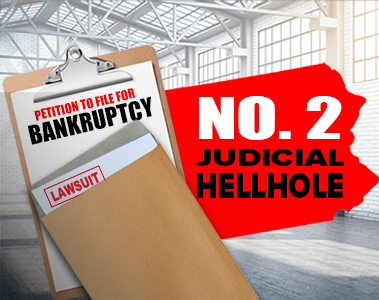State Supreme Court’s Medical Malpractice Rollback Ranks PA Among Top Judicial Hellholes in U.S.
Pennsylvania’s civil justice system has long been viewed as slow, unbalanced and costly – it’s no wonder, then, that it’s consistently been ranked among the worst “judicial hellholes” in the nation, according to the American Tort Reform Association.
 In 2022, the state Supreme Court landed another blow by deciding to eliminate the state’s venue rule for medical liability lawsuits. This undid a fix from 2003 when Pennsylvania faced a physician shortage crisis arising from medical liability premium costs that were the result of an out-of-control litigation climate and “jackpot jury awards.” At that time, the PA Chamber supported the medical community’s successful efforts to change the state court system’s rules to require complaints to be filed in the county where the alleged injury occurred (instead of Philadelphia County, which is well known to favor plaintiffs.) Until the court inexplicably reversed the decision, the reforms had led to a better climate for doctors, nurses and healthcare providers and addressed the exodus of providers from Pennsylvania. It also improved access to care for patients while helping to control costs on the healthcare system.
In 2022, the state Supreme Court landed another blow by deciding to eliminate the state’s venue rule for medical liability lawsuits. This undid a fix from 2003 when Pennsylvania faced a physician shortage crisis arising from medical liability premium costs that were the result of an out-of-control litigation climate and “jackpot jury awards.” At that time, the PA Chamber supported the medical community’s successful efforts to change the state court system’s rules to require complaints to be filed in the county where the alleged injury occurred (instead of Philadelphia County, which is well known to favor plaintiffs.) Until the court inexplicably reversed the decision, the reforms had led to a better climate for doctors, nurses and healthcare providers and addressed the exodus of providers from Pennsylvania. It also improved access to care for patients while helping to control costs on the healthcare system.
In a statement about the decision, PA Chamber President and CEO Luke Bernstein said it will “only harm health care providers and further diminish our state’s competitiveness, without serving the interests of patients. The reforms previously enacted worked for Pennsylvanians, and this action by the court sets us backwards. If an incident took place in Cumberland or Westmoreland County, and there are no conflicts for the case to be heard there, why should it be moved to Philadelphia County or vice versa? We strongly urge … legislation establishing fair rules for venue in these types of civil cases.”